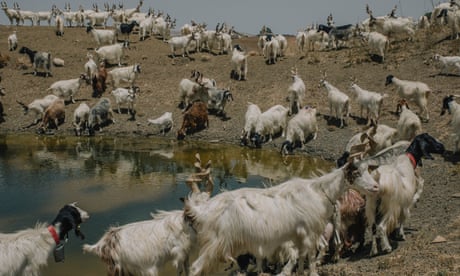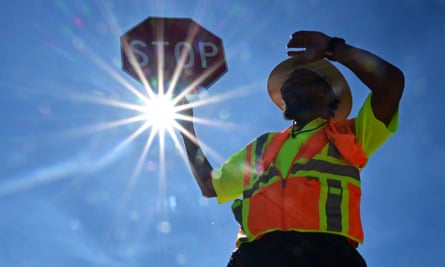The main purpose of this ongoing blog will be to track planetary extreme, or record temperatures related to climate change. Any reports I see of ETs will be listed below the main topic of the day. I’ll refer to extreme or record temperatures as ETs (not extraterrestrials).😉
Main Topic: Biden’s New Safeguards from Heat for Outdoor Workers
Dear Diary. This won’t happen if Trump becomes President in 2025, but it’s high time for regulations to safeguard outdoor workers from severe summer heat, particularly in this day and age of climate change. In truth, I am a little surprised that there were ‘t already regulations to protect outdoor workers from severe heat. Workers should have required breaks, and water needs to be offered during those breaks.
According to the Guardian article I’m using for today’s main topic, hundreds of U.S. outdoor workers who mainly pick crops succumb to heat each year. Here is that article:
Biden attacks Republican climate deniers as he unveils extreme-heat rules
President hails proposal to protect millions of Americans from extreme heat – the top weather-related US killer
By Dharna Noor
Tue 2 Jul 2024 14.20 EDT
President Biden on Tuesday trumpeted new rules from his administration that aim to protect Americans from extreme heat.
“Extreme heat is the No 1 weather-related killer in the United States,” he said at the Washington DC Emergency Operations Center. “More people die from extreme heat than floods, hurricanes and tornadoes combined.”
The speech came hours after the White House unveiled a long-awaited proposal to establish the nation’s first-ever federal workplace standard for extreme heat. If finalized, the rule “will substantially reduce heat injuries, illnesses and deaths for over 36m workers … construction workers, postal workers, manufacturing workers and so much more”, Biden said.
Labor and climate activists celebrated the administration’s new heat stress rule proposal, but finalizing it will be an uphill battle. It faces potential legal challenges from trade groups, and if Trump wins the November election, his administration could also refuse to greenlight the measure.
The White House also announced $1bn in grants for over 650 climate resilience projects across the country on Tuesday. Washington DC will receive over $3.5bn for infrastructure upgrades, said Muriel Bowser, the mayor, in her opening remarks.
Announced on Tuesday amid temperature warnings across the country, the rule would require employers to establish heat safety coordinators, undergo extreme heat safety training, create and regularly update emergency heat response plans, and provide workers with shade and water.
It would also require a heat acclimatization process for new employees to gradually increase their exposure to high temperatures.

The proposed rule includes specific safeguards for when the heat index in a workplace breaches 80F (27C), including increased access to water and temperature-controlled break rooms. At a 90F (32C) heat index, the standard would trigger additional protections, including paid 15-minute breaks every two hours, mandated observation of employees and hazard alerts for all workers.
Employers who fail to meet the standard could be subject to fines. Under the Occupational Safety and Health Administration’s general-duty clause, workplaces with dangerous levels of heat stress can be subject to penalties of roughly $16,000; the rule would substantially increase that amount, administration officials said.
In addition, the Environmental Protection Agency has released a new report showing the continued impacts of the climate crisis on people and ecosystems, while the Federal Emergency Management Agency will in the coming days finalize a rule to factor the impacts of flooding into all federally funded construction projects. And later this summer, the White House will also convene the first-ever White House summit on extreme heat, Biden said.
In Washington, the president railed against Republicans who “deny that climate change even exists”. Not a single congressional Republican voted for the Inflation Reduction Act, he noted, adding that many are now trying to repeal its green provisions. Donald Trump and “Maga Republicans in Congress” are working to “undo” the administration’s climate progress.
“I, quite frankly, think it’s not only outrageous, it’s really stupid,” he said. “When disaster strikes, there are no red states or blue states.”

Advocates and policymakers celebrated the move. “For decades, workers have been organizing for federal protections from the extreme heat. Despite opposition from big corporations, these working families are finally winning the protections they deserve,” said Representative Greg Casar of Texas, who last year went on an all-day thirst strike calling for heat protections.
Juley Fulcher, worker health and safety advocate with Public Citizen, said the plan was a “monumental victory for those who toil in the summer heat”.
“If enacted, the simple measures to protect workers – water breaks, a cool spot to recover and rest – will provide key protection from illness, injury and death.”
Extreme heat is the deadliest form of extreme weather, killing hundreds of Americans each year. The threat is increasing amid the climate crisis.skip past newsletter promotion
The Occupational Safety and Health Administration (Osha) projects that the rule would affect 36 million workers such as delivery people and mail carriers, construction workers and agricultural laborers, substantially reducing heat injuries, illnesses and deaths.
Dozens of workers die from heat exposure in the workplace every year. Federal data shows that the US saw 436 such deaths between 2011 and 2021 – a count that experts widely regard as conservative.
After years of pressure from climate and labor advocates, Osha began the years-long process of creating the federal heat rules in 2021. Last month, the agency submitted a proposal to the Office of Management and Budget for review. The speedy approval was possible thanks to years of hard work to craft a robust rule, according to senior administration officials.
The new rule would apply to all 50 US states, including Texas and Florida, which have passed laws preventing municipalities from adopting workplace heat safety measures. The 22 states that maintain their own Osha-approved workplace rules would be required to pass regulations that meet or exceed the federal heat standard’s protections.
The finalized proposal is a landmark step, but the Biden administration faces a long road ahead to ensure workers are protected from extreme heat. If Donald Trump wins in November, his administration could torpedo the effort.
The rule is also likely to face legal challenges from businesses and lobbying groups that have staunchly opposed such a measure.
Biden, however, assured attendees that the efforts will succeed.
“We’re just getting started here, man,” he said. “I’m confident we’re going to get this done.”
Despite years of public pressure, the Biden administration has not, however, declared a climate emergency. Doing so would unlock a trove of unilateral emergency powers to help quell the climate crisis.
Experts agree that curbing the climate crisis will also require the US to swiftly phase out fossil-fuel production. No country has ever produced more oil and gas in a single year than the US did in 2023.
Here are more “ETs” recorded from around the planet the last couple of days, their consequences, and some extreme temperature outlooks, as well as any extreme precipitation reports or outlooks:
Here is more new June 2024 climatology:
Here is More Climate News from Wednesday:
(As usual, this will be a fluid post in which more information gets added during the day as it crosses my radar, crediting all who have put it on-line. Items will be archived on this site for posterity. In most instances click on the pictures of each tweet to see each article. The most noteworthy items will be listed first.)